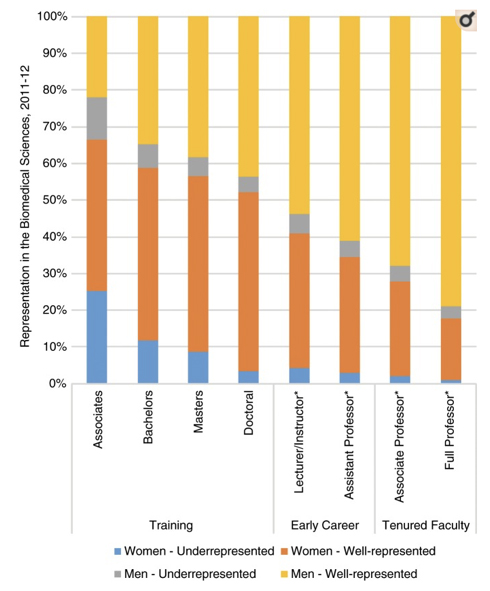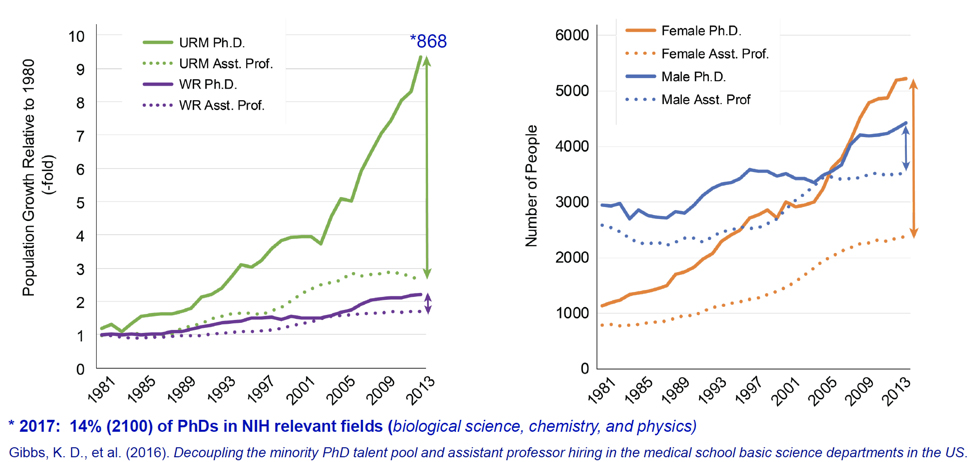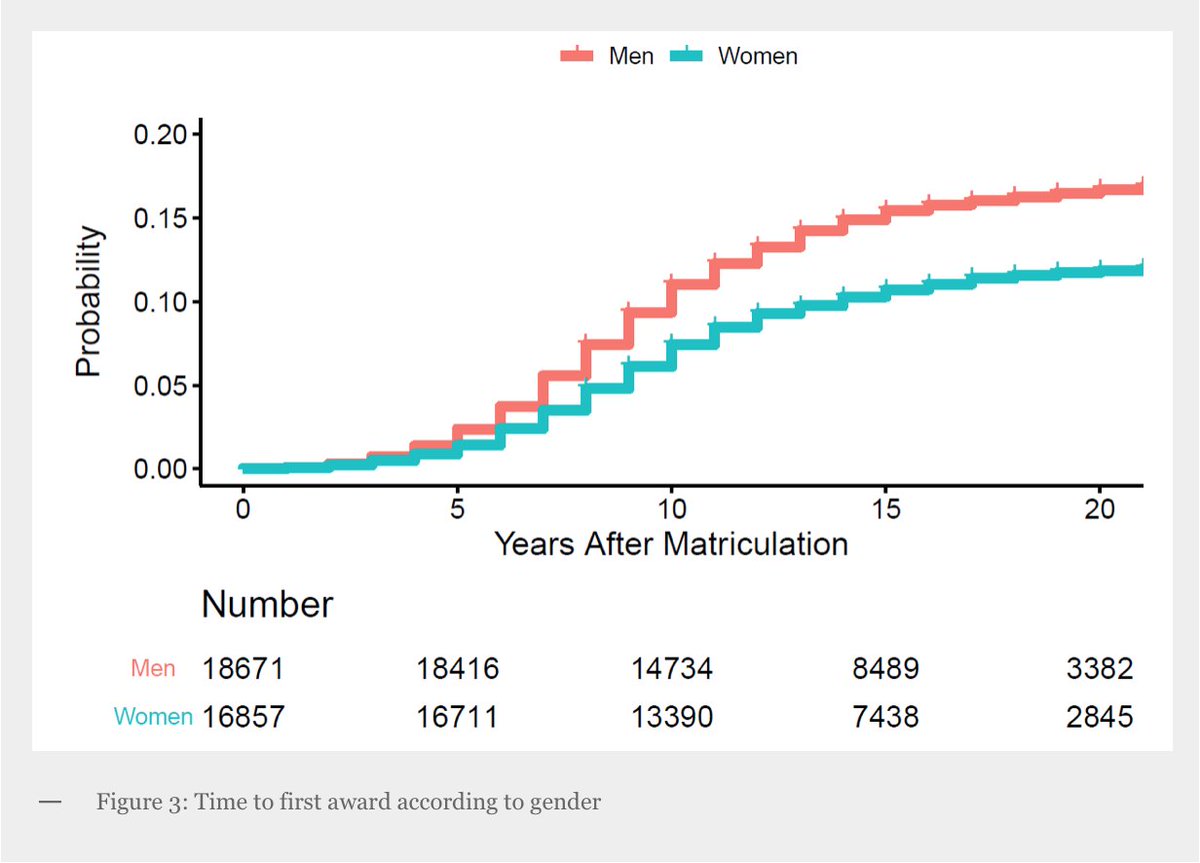
watching now: videocast.nih.gov/livew.asp?live…
https://twitter.com/NIHDirector/status/1365335956195311625
increase in success rates for AA/B applicants from ~22% to ~43% for K grants and from ~12% to ~23% for R01 grants from 2013-2020
"still very small number of investigators"
"incremental improvement"
"still very small number of investigators"
"incremental improvement"
now reporting on suggestions of group convened to discuss racism in science, mentions shift in directness of language about racism and anti-Blackness in the group
emphasis on personal AND institutional support of Black scientists
"Why emphasis on Black scientists?"
questioner is concerned about emphasis on singularity of Black scientists
questioner is concerned about emphasis on singularity of Black scientists
Wilson mentions meeting took place after George Floyd murder and that lent urgency to conversations, with focus on anti-Blackness in science. Points out that suggestions can be extended to many groups that experience bias in science
I understand the inclination to ask this question but support for underrep'd scientists is not pie; improving the experience and support for Black scientists will likely help many non-white scientists and this frames the question in a way that white supremacy prefers, IMO
question about the pipeline: "Do we know that this support is going to the right populations?"
answer: "proxies we use are imprecise." mentions that it's a consequence of legal constraints
answer: "proxies we use are imprecise." mentions that it's a consequence of legal constraints
people still really like the pipeline argument
all members of group accept report
aaaaand just lost the live feed
it's back! UNITE = 5 committees to strengthen diversity, equity and inclusions
each committee's cochair will present (slightly out of order)
each committee's cochair will present (slightly out of order)

U group: perform a broad, systemic evaluation to id elements and barriers that perpetuate structural racism in the NIH
one focus: listening to accounts and experiences to generate quantitative and qualitative data to promote action, including anonymous submissions, town halls and a RFI on practical and effective ways to improve racial and ethnic inclusivity
N group: address long standing health disparities and issues related to Minority Health at NIH
one strategy: develop methodology to assess NIH portfolio
one strategy: develop methodology to assess NIH portfolio
GREAT idea: use Common Fund Initiative to raise profile of research into health disparities and enhancing health equity
proposed FOA in March 2021
proposed FOA in March 2021
1st FOA: open to all investigators
2nd FOA: focused on increasing competitiveness of MSIs
2nd FOA: focused on increasing competitiveness of MSIs
future FOA in Winter 2022 focused on interventions to address health disparities
I: Improving NIH culture and structure to promote diversity, equity and inclusivity throughout NIH workforce
Focused on:
culture change
recruitment
retention/advancement
accountability
Focused on:
culture change
recruitment
retention/advancement
accountability
racial disparities in make up of NIH workforce when disaggregated into scientific, health and research, infrastructure and NIH leadership
AA/B underrep'd in scientific and leadership areas at expense of white and Asian people
AA/B underrep'd in scientific and leadership areas at expense of white and Asian people
E: Extramural Research Ecosystem: Changing policy, culture and structure
evaluating NIH extramural policies that perpetuate systemic inequities
evaluating NIH extramural policies that perpetuate systemic inequities
appreciate the point that some viewers are data points in presented data about funding success rates of AA/B applicants
framework to guide efforts:
career pathways and ongoing barriers
limited resources/capacities ar HBCUs and MSIs
interventions that shift environments and cultures to promote equity
processes and procedures at NIH that maintain inequity (peer review, interactions of staff, etc)
career pathways and ongoing barriers
limited resources/capacities ar HBCUs and MSIs
interventions that shift environments and cultures to promote equity
processes and procedures at NIH that maintain inequity (peer review, interactions of staff, etc)
- "It's time for us to listen:" RFI to get stakeholder input and listening sessions
- expand existing grant funding data (available 2-3 weeks)
- possible programs (assess interactions with NIH staff and members of underrep'd groups and focus on HBCUs and MSIs)
- expand existing grant funding data (available 2-3 weeks)
- possible programs (assess interactions with NIH staff and members of underrep'd groups and focus on HBCUs and MSIs)
T: transparency, communication and accountability assessment of all UNITE efforts with internal and external stakeholders
appreciate the emphasis on evaluation of programs to see what is and what is not working
appreciate the emphasis on evaluation of programs to see what is and what is not working
webpage that will be a central portal for anti-racism policies and efforts at NIH in effort to increase transparency
great question: What does success look like?
Answers: This is a marathon addressing complex issue
more granular answer: Each committee has a tracking document that the T committee will use to hold the other committees accountable. Sense of success might shift with time
Answers: This is a marathon addressing complex issue
more granular answer: Each committee has a tracking document that the T committee will use to hold the other committees accountable. Sense of success might shift with time
Such a missed opportunity for an overarching vision.
"K-12 education"
"pipeline problem"
*drink*
"pipeline problem"
*drink*
THANK YOU to the person pointing out that we need to move away from the pipeline metaphor to a pathway metaphor
is nobody going to point out that there are already Black grad students, post-docs and PIs who need this support and cultural shift?
another question: how will the ICs coordinate given the pan-NIH presentation?
question: how are trans-NIH groups that addresses specific racial and ethnic populations integrated with UNITE committees?
answer: they are members of the UNITE committees to coordinate them
answer: they are members of the UNITE committees to coordinate them
question raising concern about whether HBCUs can be brought up to quality of R1s
great answer tho: partnerships are fruitful, useful and important when it's clear you want a true partnership
also beautiful reframing by someone else of the question to capacity building
great answer tho: partnerships are fruitful, useful and important when it's clear you want a true partnership
also beautiful reframing by someone else of the question to capacity building
literally yelled out loud in my office at this question
great question about financial stability as a barrier to retaining Black and other under-rep'd students
great suggestion: expansion of loan repayment or forgiveness programs
great suggestion: expansion of loan repayment or forgiveness programs
Common Fund Concept Discussion: Transformative Research to Address Health Disparities and Achieve Health Equity
again, I want to say I think this is SUCH a great idea
again, I want to say I think this is SUCH a great idea
"same storm, different boats"
boats = differences in resources and capacity affect what health questions are answered
requires comprehensive solutions = use of Common Fund
boats = differences in resources and capacity affect what health questions are answered
requires comprehensive solutions = use of Common Fund
each project is expected to include interventions 👏🏽👏🏽
framework of health equity
"We want to turn the NIH into the National Institutes of Hope:" such a great line by Dr. Rivers
"We want to turn the NIH into the National Institutes of Hope:" such a great line by Dr. Rivers

VERY good point about what constitutes a MSI and having to grapple with that
acknowledgement that some are already well-resourced
acknowledgement that some are already well-resourced
concern that FOA has to include intervention which excludes basic research
Dr. Collins points out he was the one who pushed for this qualification, based on focus on observational studies in the past and fact that it's a way to directly address health equity
Dr. Collins points out he was the one who pushed for this qualification, based on focus on observational studies in the past and fact that it's a way to directly address health equity
DO I ACTUALLY AGREE WITH DR. COLLINS?
great pushback to keep emphasis on interventions
great pushback to keep emphasis on interventions
all ACD members support the use of the Common Fund for health disparity research
• • •
Missing some Tweet in this thread? You can try to
force a refresh








